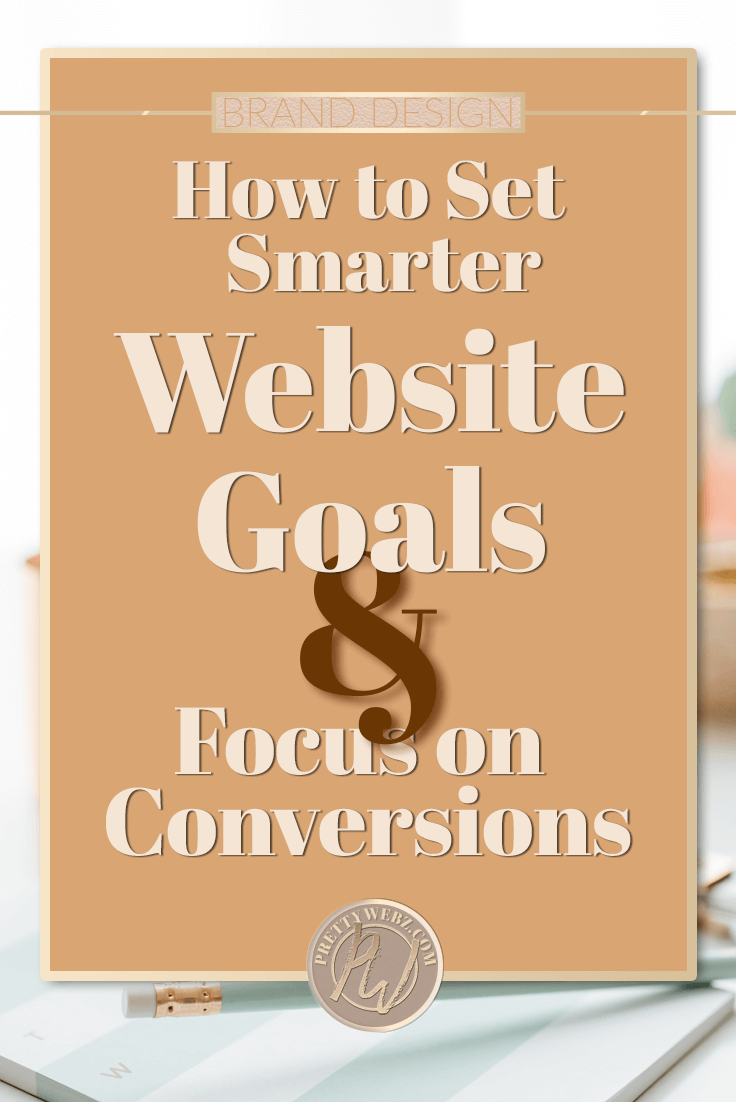How to Set Smarter Website Goals & Focus on Conversions
Your website should be more than just a dumping ground for all things related to your business. Your website can be a conversion tool that works 24/7. Investing a little time to set your website goals will help you create your website workhorse. The center hub to your online presences is more than just a pretty face. If used correctly, it is a very powerful tool for generating lasting relationships with your customers and making more money.
Do you want more out of your site than just a pretty face for your business? Branding and aesthetics are only a part of your brand’s overall impression on your customers. Your website can be very strategic and functions in a specific way to help you market your business and create maximum efficiency for your sales funnels and marketing.
An Argument for Setting Website Goals
Why would you want to go through all the trouble of establishing goals and getting clarity on this subject? Being strategic from the beginning will give you faster results. You will have fewer missteps and waste less time in the long run. Plus, you will make more money! Did I mention that already?
With planning, a strategic website is simple and straightforward. Often people get anxious or they feel like they understand their business well enough that they don’t have to set goals.
In the long run, not planning will cost you in time and lost revenue. Creating goals and having a strategic plan is the shortest route to success. Getting clear on your business and website goals are also the easiest ways for you to plan things like advertising, promotions and direct marketing on your website. Your website can be a very powerful tool if it’s used correctly.
Creating a Foundation for Website Design Functional Planning

If you don’t know a lot about sales funnels and you’re not real big on marketing, don’t worry. Defining website goals is not about complicated sales strategies. This is about clarifying your company goals in a way that makes it effortless to implement features on your website to support those goals.
I’m going to keep it super simple as I know a lot of people have blogs and online shops but are not necessarily marketing experts.
This post is going to serve as the foundation for a few other posts I have in the works all about using your website design strategically to support your business goals. With this planning phase out of the way, the design concepts we go over in coming posts will be fast and easy.
Who Should Set Website Goals
If you’re using a web page builder or doing a DIY website, make sure that your goals and the plan that you have for your website are set before you start adding stuff to your sidebar and to your front page. You may be tempted to add everything and the kitchen sink to your site then end up with something that doesn’t perform well and looks like a hot mess.
Even if you’re working with a designer and a developer you still need to understand the goals of your business in order to get the most effective use of your website. You don’t have to read the other posts that we have planned for designing sections of your site but please go over these questions anyway.
You should at least understand and be super clear on the goals that you have for your business and how your website needs to function in order to support those goals. Getting clear on your website goals will help your designer immensely and will make the design process go much more smoothly. Great communication and clear understanding of what you need will ensure that you get a website that works for your business.
Setting Your Website Goals
You may already have a business plan that has all of this information ready to go, if that’s you then you already have a head start. Pull out your business plan and add some space for one more section, the website strategy. In this section, you can add these website focused questions.
For everyone else, you can use this as a reference when creating your business plan later.
Website goals, Business Goals, and Branding

Colors and typography and all of the things that we typically associated with branding are a part of your website aesthetic.
Your values, brand voice, culture and all of those things are tied to the goals of your business. When brought together, website goals, business goals and branding all work together to create the best possible experience for your clients and customers.
Website Goals Questions
1. What is the reason your building this website?
This can be a loaded question because there are a lot of different ways to answer it. However, in this context, you want to state specifically how you want your website to benefit your business. How is this website going to support the overall business that you’ve created?
It’s important that you think about this question seriously. Give this question some time and a lot of thought. This is the goal that’s going to establish the direction of your website as a tool rather than just a pretty place for your customers to visit.
2. When a person comes to your website for the first time what is the biggest priority you have for that user?
The priority is the primary call to action. It could be anything, but here are some common and very basic examples.
- Opt-in
- Buy
- Read
- Click
All of this depends on the type of Business you run. Here are some more targeted examples.
- An online shop with low priced items will probably want customers to buy or go to the shop page.
- A company that sells higher-priced items or items that require a large time commitment might have a first and primary CTA (call to action) to get an opt-in. This way the company can provide more information and support the decision-making process at a much slower pace (increase opt-ins).
- Bloggers that mainly do affiliate marketing on their sites main priority might be to get them to click on an affiliate offer or get an opt-in to promote affiliate offers (increase opt-ins, clicks).
- A sales page will have an objective to click the buy button (increase “Thank You” page visits).
- A blog has the objective to get you to read something (increase time on page or bounce rate).
If you’re having trouble deciding what your main objective is, focus on growing an email list. That way you’re creating the initial relationship. Relationship building is something that’s universal to all business. A direct platform to communicate with potential customers is extremely valuable.
Check out this article on website goal examples, if you need some more ideas. When you have a clearer understanding of your customers you may also want to explore other things that may work much better for your specific business.
3. What is your buyer’s journey?

Non-customer >>> prospect >>> lead >>> customer (or something similar depending on your business)
Here are some questions you might ask yourself in order to trace your customer’s journey.
- How did she find you?
- What makes her want your product?
- What is the thing that makes her purchase your product?
Here are some examples:
- Facebook ads >>> a webinar >>> a sales page >>> and that’s where she typically buys
- A podcast >>> a content upgrade >>> an email or pixel retarget >>> targeted ads >>> and then to a purchase
- Instagram promo or sale >>> a shop page >>> and then she makes a purchase
- Email >>> directs her to an affiliate link >>> she clicks >>> and then she makes a purchase
- An email >>> to a flash sale >>> to the shop >>> and then a purchase
These are all examples of very simplified buyer’s journeys. Think about what journey your customers go on to get to a sale on your website.
That’s It! This Was the Hardest Part
Web design becomes overwhelming when you don’t have established goals set to guide you. Get clear on what you want to accomplish with your website and what goals you want your website to help you support and everything else will be easy. You will be able to get a plan in place easily and everything goes a lot more smoothly.
At this point, you may not know what the design should look like. You may not know what you should put on your homepage or what should be in your footer and your sidebar. All of those things can be a little hazy. This is especially true in the beginning stages of your business.
Your plan may be to “copy and paste” from your favorite sites. Picking up things here and there that you think will be aesthetically pleasing. However, a pieced together website is not going to help you achieve the goals that you set for your specific business. The website designs that you love may be beautiful but they may not be the ideal design for your business goals.
You have to get strategic and understand your business rather than taking bits and pieces from other websites and crossing your fingers that it’s all going to work out.
What’s Next?
Now that you have an understanding of how you want your website to work for your business you’re in a much better position for designing the perfect website for your business. Make sure to come back next week where we’ll go over some homepage design fundamentals using website goals in a strategic way. You will be pleasantly surprised how much better your site will flow when everything has a purpose, a sequence, and a strategy. In the meantime check out some of our posts about branding, color palettes, typography, and mood are all integral parts of your user’s overall experience. Make sure they get the best experience possible when they visit your site.
If you need help with personal or business goals goal setting worksheets and printables check out some of our simple but effective planner pages as well.
Did you like this article? Pin this Image, it would make my day!


